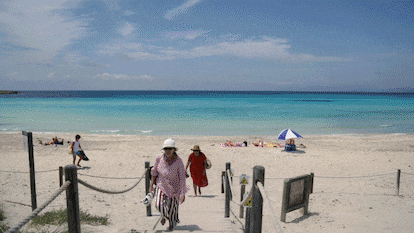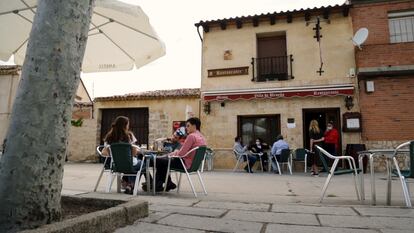Welcomed and feared: How tourists in Spain are being received amid the coronavirus crisis
EL PAÍS travels to two vacation destinations to see how locals feel about the arrival of visitors for the summer season as the risk of Covid-19 persists


“The risks for us are just beginning now.” That’s how the 200 residents of the Spanish village of Urueña sum up their feelings about the arrival of tourists this summer amid the threat of new coronavirus outbreaks.
Located 50 kilometers from Valladolid, this tourist town shut down a week before the Spanish government declared a state of alarm in a bid to curb the spread of Covid-19. It has not recorded a single coronavirus case and residents are wary about the arrival of visitors, who nearly triple the village’s population over the holiday season.
As the vacation period looms, many communities, such as Urueña, are torn between the fear of contagion and the need to welcome back tourists for economic reasons. Although residents in Urueña are eager to see their streets buzzing with life again, they are also keen to exercise caution. “We live from tourism here,” says Francisco Rodriguez, the mayor of Urueña. “But if you told me 100 people were about to descend on the village, I’d say no immediately. We don’t want buses or crowds. We would prefer something more family-orientated and relaxed.”

It’s a very different story on the coast – Spain’s main tourist destination in summer. The 3,000 residents of San Francesc Xavier, the capital of the Balearic island of Formentera, are adamant that the season must begin now. “Tourism is our only economic engine,” says Alejandra Ferrer, the head of the Formentera local government. “We have taken all the precautions necessary to make this a safe destination and we have to reactivate the economy by getting used to the new normality, without fear,” she adds, in reference to Spain’s post-lockdown and deescalation period.
In San Francesc Xavier, there have been 10 confirmed cases of Covid-19 and one death. Now the streets have begun to recover their holiday vibe with restaurants and shops reopening. All those with businesses are keen to get the season – and the economy – started. “We have to learn to live with the virus and find a balance in order to get back at least to the figures we had in the past,” explains Pep Mayans, the president of Formentera’s Small and Medium Business Federation (PIMEEF).
In 2019, the island received 1,295,000 visitors, most of them from abroad. In 2020, the tourism has so far been mainly domestic, according to data from Formentera’s tourism department.

Fear for the elderly
The people of Urueña – also known as Spain’s “book village” – live primarily off culinary and cultural tourism as its streets boast five museums and 11 bookstores. In fact, it is the only village in Spain that has more museums than bars, but its quiet streets have not yet recovered their pre-pandemic bustle. “The bookstores, museums and restaurants have to reopen, but we are also afraid for the locals as 60% are over 70 and we are convinced that the virus has not yet been in Urueña,” says Luis Enrique Valdés, director of the Miguel Delibes e-LEA writing and reading museum. “So we find ourselves like Meryl Streep in Sophie’s Choice,” he adds, referring to the movie where the US actress must choose between her two children.
Contrasting campaigns
The tourist campaigns launched by the two towns have also conveyed very different messages. While Formentera targets tourists directly through social networks, with videos and slogans such as “We missed you!” and “We want you back!,” in Urueña, the focus has been on responsibility and safety with a campaign called Responsible Tourism launched by the Most Beautiful Villages of Spain Association, to which it belongs.
As rural tourism is likely to be popular this year, the president of this association, Fran Mestre, insists it is simply a matter of making visitors aware that they will be expected to behave responsibly. “We are only asking for the same level of responsibility in the village as is practiced in the city – masks and safe distancing measures,” he says. “That people don’t let their guard down just because a village seems like a safer place.”
English version by Heather Galloway.
Tu suscripción se está usando en otro dispositivo
¿Quieres añadir otro usuario a tu suscripción?
Si continúas leyendo en este dispositivo, no se podrá leer en el otro.
FlechaTu suscripción se está usando en otro dispositivo y solo puedes acceder a EL PAÍS desde un dispositivo a la vez.
Si quieres compartir tu cuenta, cambia tu suscripción a la modalidad Premium, así podrás añadir otro usuario. Cada uno accederá con su propia cuenta de email, lo que os permitirá personalizar vuestra experiencia en EL PAÍS.
¿Tienes una suscripción de empresa? Accede aquí para contratar más cuentas.
En el caso de no saber quién está usando tu cuenta, te recomendamos cambiar tu contraseña aquí.
Si decides continuar compartiendo tu cuenta, este mensaje se mostrará en tu dispositivo y en el de la otra persona que está usando tu cuenta de forma indefinida, afectando a tu experiencia de lectura. Puedes consultar aquí los términos y condiciones de la suscripción digital.








































